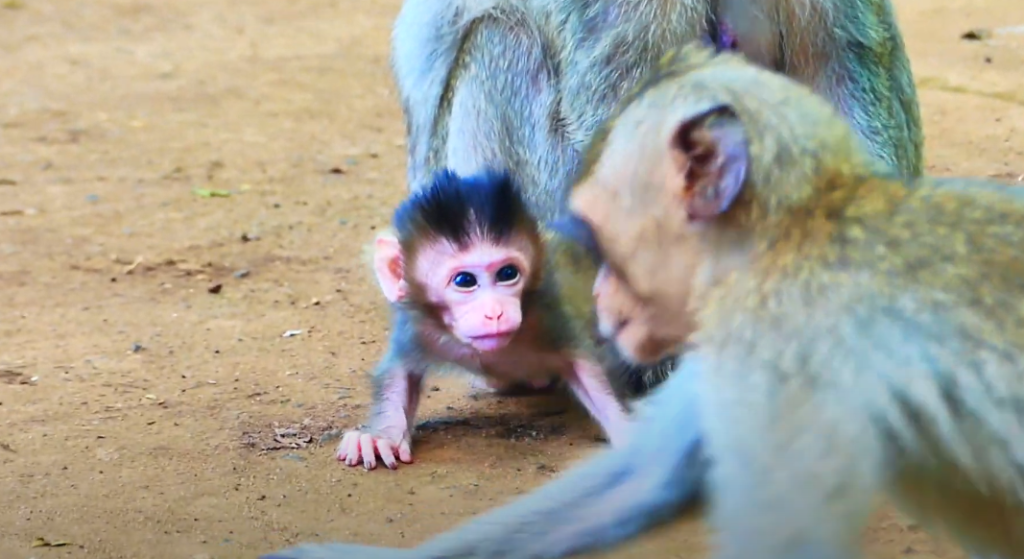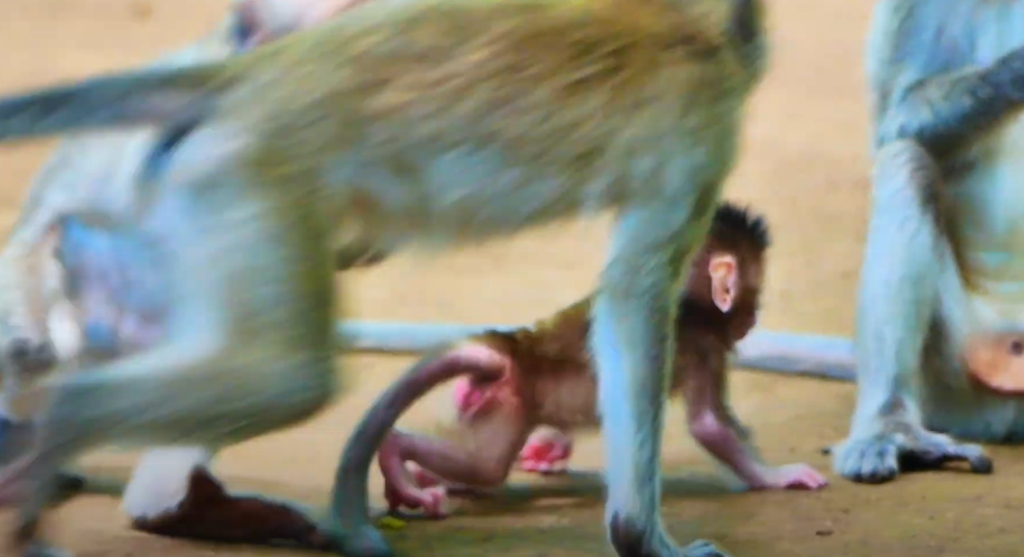

In the vast forests or even on the outskirts of towns, macaque monkeys often capture the hearts of many with their fascinating, human-like behaviors and distinct personalities. Their social structures, communication styles, and complex relationships are the basis for much intrigue. However, there are moments in nature that make even the most devoted animal lovers pause and reflect on the harsh realities these creatures face. One such poignant scene unfolded recently, leaving many in despair as they witnessed a tiny baby macaque being tenderly cared for by a much younger “mom” before the true mother left it behind, alone and vulnerable on the cold cement.
The baby macaque, no older than a few weeks, had already begun to show signs of dependence on its mother. In the animal kingdom, especially for macaques, maternal care is a crucial part of survival during the early days of life. Baby macaques rely heavily on their mothers for nourishment, warmth, protection, and learning social behaviors. But this particular story was different.
On a busy, urban street, away from the security of the forest, a small macaque troop wandered, searching for food. The baby, with its soft brown fur and wide, curious eyes, seemed to be attached to a slightly older macaque, one that appeared more juvenile than maternal. It wasn’t clear if this macaque had given birth or had simply taken on the responsibility of looking after the infant temporarily, perhaps due to a lack of other immediate caregivers in the group. What followed was a heartbreaking scene that would stay in the hearts of all who witnessed it.
The little macaque, clearly a youngster, held the tiny baby closely, protecting it from the surrounding chaos of the human world. As cars zoomed by and people milled around, this young macaque did its best to care for the defenseless baby. The scene seemed almost too tender to be true—a young creature doing what it instinctively knew to care for another, even when it seemed to lack the maturity and strength of an adult.

But then, just as the onlookers thought there might be hope for this tiny creature’s future, the true mother of the baby macaque appeared, nonchalantly and without any obvious concern. It was as if she didn’t even notice her baby clinging to the younger macaque. Without hesitation, the mother turned away, walking off into the distance, leaving her baby behind. The young macaque, caught in an impossible situation, looked on helplessly as the true mother vanished into the shadows, leaving her newborn alone on the cold, unforgiving cement.
This heart-wrenching moment raised numerous questions about the behavior of macaque mothers. In nature, abandoning one’s offspring is a rare and troubling occurrence, often indicating some form of dysfunction or distress within the group. Macaques are typically protective mothers, deeply bonded to their babies, and their roles in the social structure of the group are pivotal for the survival of the young. The scene witnessed in this instance seemed an anomaly, pointing to perhaps larger issues surrounding the macaque’s environment.
For the tiny baby macaque, the situation was dire. Left on the hard cement, vulnerable to the elements and predators, the infant was at a serious disadvantage. Without its mother’s protection, it had no access to the nourishment and warmth needed for survival. The little macaque, who had tried so valiantly to care for it, seemed as helpless as the baby, caught in an environment that demanded more than what its young age and inexperience could handle.
The experience of witnessing this abandonment on the streets was a reminder of the vulnerability of these creatures and the threats they face, even outside the natural habitats of forests or jungles. Urbanization and human interference in their habitats have pushed macaques into areas where they are more exposed, and sometimes, they fall prey to neglect or abandonment.
This sad tale of the baby macaque calls attention to the fragile relationships that govern the lives of these animals and the harsh realities they face in an increasingly encroached world. It serves as a call to action for conservation efforts and a reminder of the deep, emotional bonds many animals form—bonds that are not always guaranteed to protect them.
Though this story has a somber tone, it is a crucial reminder of the empathy and care needed to safeguard the lives of creatures who share our world. If we all work together, maybe we can ensure that no baby macaque, or any animal, will ever have to experience such abandonment again.